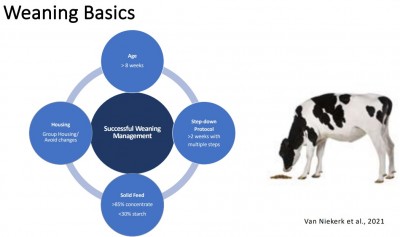Are you Winning with Weaning?
Katie Callero, Dairy Management Specialist
Southwest New York Dairy, Livestock and Field Crops Program

I had the opportunity before the holiday break to tune in to a webinar with Dr. Michael Steele, a calf expert and researcher at the University of Guelph. Dr. Steele was discussing new developments in calf nutrition and in doing so, challenged the current methods used on farms using the most up-to-date research to offer new weaning recommendations. Below are the webinar's 4 key points to help farms win with their weaning management strategies.
Age
It is recommended that calves are weaned no younger than 8 weeks old. Calves younger than 8 weeks simply can't eat enough to properly prepare their metabolisms and stomach to transition onto a fully solid diet.
Step-down Protocol
The best way to wean is with a step-down protocol that occurs over a 2-week period and includes multiple steps. A gradual weaning strategy is always preferred. Abrupt weaning disrupts the digestive microbial environment of the calf and is a high stress event for the calf, leading to reduced performance and more health challenges.
Solid Feed
There is a very large variation in available starter compositions. The starter feed that pre-weaned calves are offered should generally be >85% concentrate and <30% starch. Starch content can vary from 10-50% in commercially available starters, so double check your starter meets the listed standards. If your calves develop bubbly manure, they could be having acidosis, which results from excess starch, and is a sign their feed composition likely needs to be adjusted.
Housing
Group or pair housing of calves is encouraged as it can help increase starter intake. The increased intake of starter is thought to be due to social learning and taking cues to eat from one another. Any changes to housing should occur before or after weaning is completed. Housing changes that coincide with weaning will cause additional stress for the calf and when they are too stressed, the calves won't eat starter. Dr. Steele recommends waiting at least a week after weaning before moving calves to new housing.
Diagram provided by Dr. Steele
Upcoming Events
Piglet Health 101
February 13, 2026 : Piglet Health 101 - Batavia, NY
Batavia, NY
This free workshop from the New York Pork Producers offers hands-on training in essential piglet care and processing practices, led by industry veterinarians from Passion for Pigs. No matter your experience level, this training offers takeaways for both new and experienced producers.
Boots in the Barn: Cornell Dairy Research Updates
January 13, 2026
January 20, 2026
January 27, 2026
February 3, 2026
February 10, 2026
February 17, 2026
February 24, 2026
Join us for some or all!
2026 No-Till & Cover Crop Conference
February 19, 2026 : 2026 No-Till & Cover Crop Conference
South Burlington, VT
Announcements
Cows, Crops & Critters Newsletter Sponsorship
TRYING TO REACH GROWERS AND AGRIBUSINESSES IN OUR SOUTHWEST REGION OF NEW YORK?Weekly Email Update: Shared with 625+ households who have signed up with our program.
Monthly Paper Mailer: To reach our stakeholders and farmers who lack internet access, we send out a monthly mailer where your company's logo and contact information would be featured with a mailing list of 330+ households.
If you sponsor our weekly and monthly publications you reach approximately 955 households.





